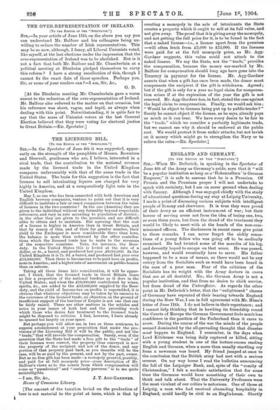THE LICENSING BILL. [To TEE EDITOR OF TUE "SPECTATOR.")
Sin,—In the Spectator of June 4th it was suggested, appar- ently on the strength of the pamphlets of Messrs. Rowntree and Sherwell, gentlemen who are, I believe, interested in a rival trade, that the contribution to the national revenue made by the licensed trade in the United Kingdom compares unfavourably with that of the same trade in the United States. The basis for this suggestion is the fact that licenses to sell intoxicating liquors are charged for very highly in America, and at a comparatively light rate in the United Kingdom.
May I, as one who has been connected with both American and English brewery companies, venture to point out that it is very
difficult to institute a fair or exact comparison between the value of licenses in the two-countries? In the one (America) they are given to the individual without any formality beyond respectable
references, and vary in rate according to population of district ;
in the other they are given to the premises, and are difficult alike to obtain and to maintain. But agreeing that the cost
of a license is higher in America than in Great Britain, and
that by reason of this, and of their far greater number, their yield to the Exchequer is more considerable there than here, the balance is more than redressed by the other contribu- tions which the licensed trade has to make to the revenues of - the respective countries. Take, for instance, the Beer- duty. In the United States this is levied at the rate of a dollar, or 4s., a barrel, and produced last year £8,000,000. In the Unite Kingdom it is 7s. 9d. a barrel, and produced last year over £13,000,000. Then there is Income-tax to be paid here on profits, none in America; and a higher rate of assessment on public-houses than on saloons.
Taking all these items into consideration, it will be appar- ent. 'I think, that the licensed trade in Great Britain bears as fair a proportion of the national burdens as it does in the
United States; and when the Xl8,000,000 contributed by wines, spirits, be., are added to the £13,000,000 supplied by the Beer-
duty, and the yield of Income-tax on profits is superadded, it is obvious that whatever objections may be taken by its enemies to the existence of the licensed trade, an objection on the ground of
insufficient support of the burdens of Empire is not one that can be fairly raised. There are other matters in the articles and notes in your issues of both last and the preceding week which those who desire fair treatment to the licensed trade might be disposed to criticise. I -feel, however, I have already tit spassed too largely on your space.
But perhaps you will allow me, in two or three sentences, to expreal astonishment at your proposition that under the pro-
visions of the Licensing Bill it will be the public, and not the
"trade'," that will provide the compensation. Surely, even if the assertion that the State had made a free gift to the "trade" of
their licenses were correct, the property thus conveyed is now the property of the recipient and not of the donor, and any portion of that property paid back, as you describe will be the case, will be so paid by the present, and not by the past, owner. But as no free gift has been made—a monopoly granted, possibly, and paid for at full -monopoly price—your description of Mr. Balfonr's views as to the source from which compensation will come as "paradoxical" and "curiously perverse" is to me quite unintelligible.
—I am, Sir, &c., J. T. AGG-GARDNER.
House of Commons Library.
[The amount of the taxation levied on the production of beer is not material to the point at itisne, which is that by
creating a monopoly in the sale of intoxicants the State creates a property which it ought to sell at its full value, and not give away. • The proof that it is giving away the monopoly, and not getting the full price for it, is to be found in the fact that a naked license—i.e., a license apart from the premises —will often fetch from £5,000 to 215,000. If the licenses were paid for at the full monopoly price, as Mr. Agg- Gardner suggests, this value could not attach to the naked license. We say the State, not the "trade," provides the compensation, because the money ear-marked by Mr. Balfour for compensation should long ago have gone into the Treasury in payment for the license. Mr. Agg-Gardner asserts that when a gift has once been made, the donor must compensate the recipient if the gift is withdrawn. Agreed-; but if the gift is only for a year no legal claim for compensa- tion arises if at the expiration of the year the gift is not renewed. Mr. Agg-Gardner has, in fact, stated the case against the legal claim to compensation. Finally, we would ask him : "Would he object to licenses being put up to public tender P" Surely he cannot object if the license, as he says, already pays as much as it can bear. We have every desire to be fair to the "trade," which We consider a perfectly legitimate trade, but we cannot see why it should be endowed at the public cost. We would protect it from unfair attacks, but not lavish on it money which might go to strengthen the Navy or to relieve the rates.—ED. Spectator.]






































 Previous page
Previous page